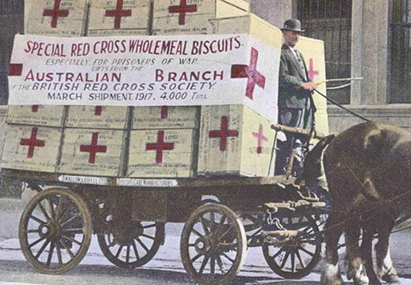Wars, laws and humanity
 |
100 years of Australian Red Cross action
Wednesday 21 May 2014
|
with Australian Red Cross CEO, Robert Tickner
Part of the world's largest humanitarian movement, Red Cross has been woven into the fabric of Australian life for 100 years. Today the International Red Cross and Red Crescent Movement has worldwide presence with a common objective to work with governments and authorities to bring understanding and support for international humanitarian law (IHL). IHL advocates that, ‘all is not fair in love and war’ and that there are methods and weapons too inhumane to be used.
Throughout its history Australian Red Cross has advocated for a more humane battlefield, and to raise awareness of the continued existence of nuclear weapons. Since the first use of nuclear weapons, the Red Cross has highlighted the catastrophic humanitarian consequences and has been calling for Nations to eliminate nuclear weapons with the aim of ensuring they are never used again. This lecture offers the opportunity to hear how the International Red Cross and Red Crescent Movement and Australian Red Cross, are working towards a more humane world by eliminating this serious threat to humanity.
Celebrate with us the incredible 100 year story of Australian Red Cross, and understand how it continues to serve Australia and respond to the changing face of international humanitarianism.
 |
 |
Co-presented by The Bob Hawke Prime Ministerial Centre and Australian Red Cross
 Robert Tickner
Robert Tickner
Since 2005, Robert has served as CEO of Australian Red Cross, with a mandate to oversee reforms to modernise and harmonise the work of Australian Red Cross to increase the organisation’s capacity to work for vulnerable people. In 2012, Robert was seconded to the International Federation of Red Cross and Red Crescent Societies in Geneva.
Robert has previously served as CEO of Job Futures Ltd, and Federal Minister for Aboriginal and Torres Strait Islander Affairs. He has an academic background in law, economics and business.
Full abstract
The Red Cross was created in 1863 when Henry Dunant set up the International Committee for Relief to the Wounded, that later became the International Committee of the Red Cross. Australia adopted the Red Cross concept nine days after the outbreak of WWI, with a mandate to alleviate suffering during times of war and to promote humanitarian values and principles on the battlefield.
Australian Red Cross has become part of a global movement namely the International Red Cross Red Crescent Movement (the International Movement). The International Movement was also created on the battlefield where the mandate to alleviate suffering during times of war stems. Today the International Movement has a worldwide presence with a common objective to work with governments and authorities to bring understanding and support for international humanitarian law (IHL). IHL advocates that, ‘all is not fair in love and war’ and that there are methods and weapons too inhumane to be used. The International Movement has a long and proud history in assisting with developments in IHL weapons laws reflected in their focus on public health and humanitarian consequences of various weapons.
Throughout its history Australian Red Cross has advocated for a more humane battlefield, and to raising awareness of the continued existence of nuclear weapons. The International Movement and Australian Red Cross has a strong history on this issue. The first non-military medical personnel in Hiroshima was a delegate of the International Committee of the Red Cross who wrote about the unbelievable suffering and mysterious impact of this weapon. During negotiations at the creation of the Geneva Conventions in 1949, ARC raised the need for the conventions to abolish nuclear weapons. However neither the Geneva Conventions or the 1977 Additional Protocols specifically mentioned weapons of any kind they did provide principles to guide these debates. These included principles such as the need for weapons to distinguish between civilians and combatants; to be proportional to the military aim; and to not cause unnecessary suffering or superfluous injury.
Since the first use of nuclear weapons, the Red Cross has highlighted the catastrophic humanitarian consequences, and has been calling for Nations to eliminate nuclear weapons with the aim of ensuring they are never used again. In 2011 the International Movement developed a strong and clear policy to drive the issue back on to the international agenda. In 2013 Australian Red Cross in consultation with colleagues at the International Committee of the Red Cross, the International Federation of the Red Cross, Japanese Red Cross, Norwegian Red Cross and Austrian Red Cross developed a resolution ‘Working towards the elimination of nuclear weapons’. This historic resolution of the International Red Cross and Red Crescent Movement appeals to Nations to ensure nuclear weapons are never again used, and to create laws to prohibit their use and aim for their elimination and Australian Red Cross is leading the way.
Our work towards eliminating these weapons is an excellent example of the international Movement at its best and how we have developed together over the past century – working together to focus on issues of key humanitarian concern in the area of IHL; using persuasion and humanitarian diplomacy to shift the debate from international security to humanitarian imperatives; and continuing over a 70 year period to work towards a more humane world by eliminating this serious threat to humanity.
While the views presented by speakers within the Hawke Centre public program are their own and are not necessarily those of either the University of South Australia or The Hawke Centre, they are presented in the interest of open debate and discussion in the community and reflect our themes of: strengthening our democracy - valuing our diversity - and building our future.
The copying and reproduction of any transcripts within the Hawke Centre public program is strictly forbidden without prior arrangements.



